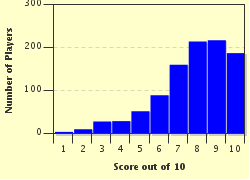Quiz Answer Key and Fun Facts
1. The etymology of the word 'humor' seems to have quite a history. Some sources place it all the way back to the ancient Greek word 'chymos', which means 'juice'. Later on, Latin adopted the word 'umor' for 'fluid', specifically 'body fluid'. The Anglo-Norman language used the modern word 'humour' to mean 'a fluid or juice from an animal or plant'. It might be easier to see the connection when we use the word 'humor' in another sense, a state: "He was in good humor." From there, the word morphed to a general blanket term for such a state to how we get to that state; something that is funny puts us in a good mood. In discussing etymology, how in the world did we get from fluids to laughter?
2. According to Anthony L. Audrieth's "The Art of Using Humor in Public Speaking", humor is "the mental faculty of discovering, expressing or appreciating the ludicrous or absurdly incongruous". From this, we can simplify the definition of humor to something amusing that is not commonplace or ordinary. But do all cultures consider the same things to be ordinary?
3. Dr. Charles Jarvis believed that since we naturally associate certain actions, such as someone falling on a banana peel, to be funny (particularly at young ages), humor is psychologically a defense mechanism for which of the following pairs of emotions?
4. Stand-up comedians or public speakers, for the most part, do not wish to offend their audiences. Oftentimes, they will employ a special type of humor that is aimed not at the cultures or characteristics of the crowd, but at the speaker himself. What is this type of humor known as?
5. Not all forms of humor are utilized in speech. A person who might want to use humor in word or visual form might use form-versus-content humor in which an overall purpose defeats the purpose of its initial intent. Which of the following would be considered form-versus-content?
6. This form of humor is an extremely effective way to not only make one laugh, but to bring one's ideals to the reader's attention. Some of its more recent adherents (seeing that it finds its roots in Ancient Greece) include: Voltaire, Jonathan Swift, Daniel Defoe, Alexander Pope, Mark Twain, Benjamin Franklin, Ambrose Bierce, Aldous Huxley, and George Orwell. It is also present in such television programs as "South Park" and "The Daily Show", and the comic strip "Doonesbury". What is this social- and political-changing form of humor?
7. Word play (or a play on words) can often be seen as humorous. While many believe that such humor is "dry", others believe it is "the highest form of humor". Which of the following is not a form of word play?
8. "Why did the chicken cross the road?" and other 'jokes about jokes' are known as what?
9. Professional (or occupational) jokes are very common expressions of humor and can be funny not only to those outside the profession, but also to those inside the profession. One profession is infamous for its genre of jokes and there is even a form of this type of joke in Shakespeare's "King Henry VI". What profession is it?
10. Anthony L. Audrieth suggests that analyzing a joke (or humor in general) takes the humor out of it. Just so I don't completely ruin laughing for you, I *promise* I will not analyze this joke at all. What goes in the blank?
"Knock, knock."
"____________"
"Boo."
"Boo, who?"
"Don't cry. It's only a joke."
Source: Author
trident
This quiz was reviewed by FunTrivia editor
stuthehistoryguy before going online.
Any errors found in FunTrivia content are routinely corrected through our feedback system.


